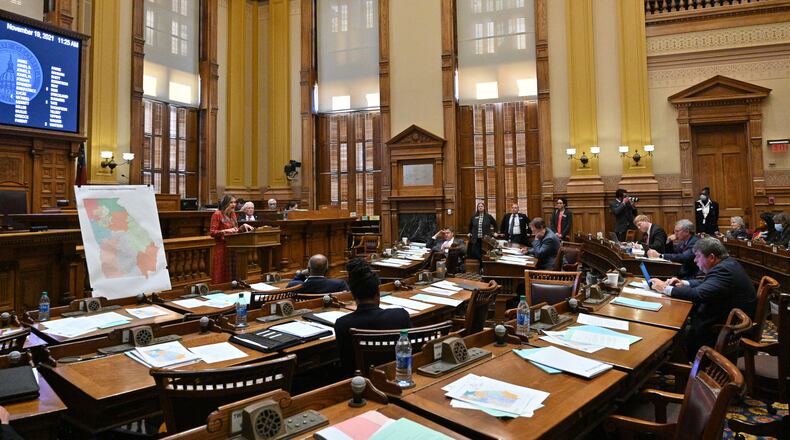Inside the courtroom at Georgia’s redistricting trial, witnesses and a judge are wrestling with fundamental questions of Black representation:
Does the state’s population growth in metro Atlanta, driven by an influx of Black residents, require greater opportunities to elect their candidates?
Or are Black voters already adequately represented, with Black Democrats holding five of the state’s 14 congressional seats, which is roughly proportional to their 33% share of Georgia’s population?
Through a week and a half of trial, the outcome remains uncertain in the case that could result in the judge ordering new political maps that benefit Black voters — and Democratic candidates, whom they overwhelmingly support.
By contrast, most white voters, whose share of the population has fallen to slightly above 50%, favor Republicans. White Republicans control nine of Georgia’s seats in Congress, a 64% majority.
U.S. District Judge Steve Jones will decide whether the Georgia General Assembly discriminated against Black residents when it redistricted the state two years ago, drawing a map that enabled Republicans to gain a seat in the U.S. House and safeguard their majorities in the state House and Senate.
“Every time that Black citizens made gains one way or another … the party in power, be it Democrat or Republican, found ways to disenfranchise,” testified Orville Burton, an expert witness for the plaintiffs and a history professor at Clemson University.
Racial discrimination against Black voters through redistricting is barred by the Voting Rights Act of 1965, but the U.S. Supreme Court has ruled that legislators in the majority party — in this case, Georgia Republicans — are allowed to draw maps for their partisan advantage.
Jones has sometimes taken over questioning of witnesses, asking them how significantly race should be weighed in redistricting and whether Black voters make decisions based on race or political party.
Credit: Georgia Reapportionment Office
Credit: Georgia Reapportionment Office
Republican defenders of Georgia’s political maps say Democrats are trying to use race as a weak justification to gain a political advantage.
“Black candidates in Georgia receive crossover support from voters of all races in general elections and in both parties’ primaries,” said Adam Kincaid, executive director for the National Republican Redistricting Trust, an organization that supports the Republican Party’s redistricting efforts. “These lawsuits aren’t about electing more minority candidates. They’re about electing more Democrats.”
Former state Sen. Jason Carter, the Democratic nominee for governor in 2014, said in court that elections should reflect demographic changes and population increases seen especially in the suburbs of metro Atlanta.
Credit: Miguel Martinez/AJC
Credit: Miguel Martinez/AJC
“The only way in these legislative districts that you’re going to be able to ensure ... there’s responsiveness to the Black community, to ensure that there’s responsiveness, is to make sure that the community gets to pick the elected officials,” Carter testified, according to a court transcript.
The plaintiffs in the case, including civil rights and religious groups, are asking the judge to order the creation of a new congressional district where Black voters could gain representation, possibly in the area west of Atlanta.
They argue that Black voters lost representation after redistricting, when Republican legislators stretched the 6th Congressional District, which was previously held by U.S. Rep. Lucy McBath, a Black woman from Cobb County, into heavily Republican and white areas to the north.
As a result, Republicans gained a U.S. House seat after last year’s elections with a 9-5 majority among Georgia’s congressional delegation, an increase from their 8-6 advantage before redistricting.
Georgia’s Black population, including those who identify as Black and at least one other race, increased by 484,000 in the decade before 2020, while the state’s white-only population declined by 52,000, according to the U.S. census. Each congressional seat has about 765,000 residents.
“(Blacks residents are) responsible for most of the growth in the state. They’ve got a strong case to make about a legal requirement that they create more districts,” said Kareem Crayton, senior director for voting and representation for the Brennan Center for Justice, a voting advocacy organization. “The state often misconstrues this as an ‘entitlement.’ It’s not. It’s a remedy to a problem.”
The U.S. Supreme Court recently upheld the Voting Rights Act’s framework to evaluate discrimination claims in redistricting cases, which requires the plaintiffs to prove that Black voters are large and compact enough to constitute a majority in a new district, that Black voters tend to vote similarly, and that white voters vote as a bloc to defeat Black voters’ preferred candidates.
Georgia lawmakers take into account many factors during redistricting besides race, such as drawing districts around communities, preserving incumbents and listening to constituents during the mapmaking process, said Mitch Seabaugh, a former Republican state senator and redistricting chairman a decade ago.
“It does lend itself to a very tricky process,” Seabaugh said. “It was very important to talk to all the members of the Senate not just about race issues and race representation, but what they consider to be important for their districts.”
To demonstrate that voting is racially polarized in Georgia, one expert witness for the plaintiffs testified about voting patterns in last year’s U.S. Senate race between Democrat Raphael Warnock and Republican Herschel Walker, both of whom are Black.
Warnock won the support of the vast majority of Black voters, while most white voters backed Walker, according to estimates by Lisa Handley, a redistricting consultant.
“Race impacts the decision on who you’re going to vote for, which party you’re going to support,” Handley testified.
The U.S. Supreme Court could soon weigh in on the Voting Rights Act again after Alabama appealed its loss in a separate redistricting case. Black residents account for 27% of Alabama’s population, but only one of the state’s seven congressional districts has a Black majority.
Georgia’s redistricting trial might conclude as soon as Thursday. Jones could issue a ruling within several weeks afterward.
About the Author
Keep Reading
The Latest
Featured





